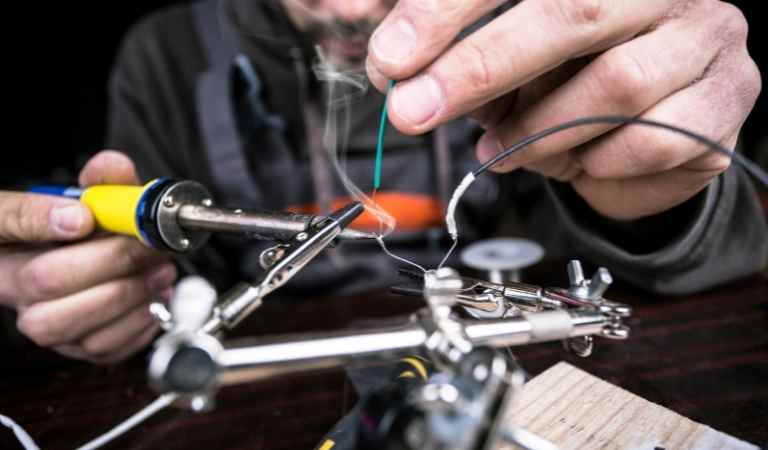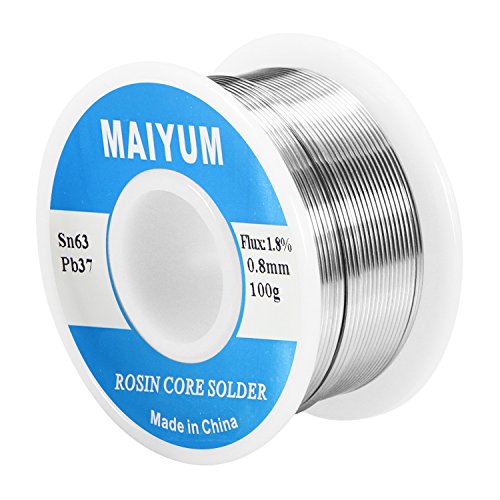Whether you’re restoring old circuits for a hobby, just tinkering around with old gadgets, or working professionally in a job that involves soldering, you’re probably tired of using the poor-quality solder available everywhere.

If the strain of using poor quality solder has led you to try finding the best solder for automotive wiring, we have good news for you: you don’t have to spend hours searching through Google.
Below, you’ll find the best soldering products on the market, along with their clear pros and cons.
After the reviews, you’ll find an easy-to-follow buying guide with tips and tricks which will help you make an informed decision.
[wptb id=1564]5 Best Solder for Automotive Wiring Reviews:
Here are the detailed reviews-
1. MAIYUM 63-37 Tin Lead Rosin Core Solder Wire
Hobbyists and professionals highly rate this Tin Lead solder wire package from MAIYUM because of its inherently high-quality solder wire made from 63% Tin and 37% Lead.
With a thickness of 0.8mm, it’s quite thinner than most of the other products on this list, but you’d be surprised at how solid the soldered joints are.
The rosin core flux is also a lovely addition to the product, giving it a smooth, seamless performance that provides long-lasting durability.
Benefits:
- 8mm wire size is perfect for smaller modern electronics
- Rosin core flux prevents the formation of tips on solder joints
- Very affordable pricing when compared to other products
- Works well for wires, boards, and compact circuits
Drawbacks:
- The soldering wire doesn’t contain any warnings about the lower melting point.
2. Cardas Soldering Wire Quad Eutectic Silver Solder
It’s hard to find good silver soldering wire, but this Cardas Quad Eutectic soldering wire works like a charm. It’s made of highly versatile 0.8mm silver, copper, tin, and lead blend, giving it smoother performance and strong joints.
Like the MAIYUM 63-37 Tin Lead wire, it also features a rosin flux core.
All in all, if you’re looking for a solder wire to treat your expensive gadgets delicately, you won’t find a better soldering wire than this.
Benefits:
- Solder works exceptionally well for delicate gadgets like music equipment
- Wire melts and heats fast to give you solid, durable connections
- Low silver content ensures that joints are cleanly done
Drawbacks:
- Several customers have complained of getting a much lower-quality product with way too much flux content.
3. YI LIN 60/40 Solder Tin Lead Rosin Core Solder Wire
The YI LIN 60/40 Solder is the soldering wire of choice for hobbyists worldwide because of its beautiful connections. It also comes with a just perfect 1.8% flux content.
Great for general DIY projects or handicrafts, the YI LIN 60/40 Solder is made of a sturdy Tin 60%-Lead 40% blend.
It comes with the advantage of being available in 0.6mm, 0.8mm, and 1mm variants.
Benefits:
- Wire flows highly well with low-end soldering guns
- You can choose the wire width you need
- Yi Lin offers 24/7 support for customers in the US
Drawbacks:
- The one issue with this product is that it tends to unspool a little when you set it down.
4. KESTER SOLDER 24-6040-0027 Wire Solder
It might be slightly more expensive, but the Kester Solder 24-6040-0027 is definitely worth its hefty price tag because of its smooth performance.
A lower melting point to keep off the heat and the 60/40 blend of this soldering wire makes it perfect for working on PCBs. It also comes with a 0.031-inch diameter, meaning it’s ideal for bigger jobs.
Benefits:
- High quality 60/40 blend makes guiding your solder easy
- The presence of quality rosin flux inside means you won’t have to apply additional flux
- Solder excels at projects like surface mounts, thick/tiny wire, and traces because of its well-performing alloy
Drawbacks:
- It sets seconds after application, which means you don’t have a lot of working time.
5. WYCTIN 60-40 Tin Lead Rosin Core Solder Wire
The WYCTIN 60-40 Tin Lead Rosin Core Solder Wire features the perfect combination of high-quality Tin and Lead and is probably the best 60/40 alloy we’ve seen so far because of its hassle-free usage.
The soldering wire breaks off cleanly and evenly, and unlike a lot of other 60/40s, it doesn’t create a lot of smoke either.
The rosin flux inside the product is also only mildly reactive, meaning you won’t have to spend hours cleaning up.
Benefits:
- The lower smoke output makes the soldering much easier to handle
- Perfect amount of flux results in perfect pinpoints of solder
- The 0.6mm is the best we’ve seen for intricate sculpturing
Drawbacks:
- The availability of 4 diameters means casual hobbyists might be confused about which one is perfect for them.
Best Solder for Automotive Wiring Buying Guide
Choosing the suitable solder wire for your project can be challenging, especially if you don’t know what you’re supposed to be looking for. The first thing you should remember when shopping for solder wire is that you pick solder meant for electronics, not plumbing solder, which is applied with a brush instead. It’s also way too messy to be used in electronics!
Below, you’ll find a complete Solder for Automotive Wiring Buying Guide, along with several other tips too:
Choosing the Right Amount of Flux
Flux has a particular purpose in soldering wire: it keeps the joint clean as soldering is applied, allowing you to work without disturbance. It also prevents annoying little gaps inside your soldered joint.
When you’re buying soldering wire, you’ll find three types of flux:
- Water Soluble, which washes off easily under slightly warm running water.
- Rosin Based, made from pine-tree rosin, provides the overall best performance.
- No-clean, which, as the name implies, doesn’t have to be cleaned up.
All three of them come with their benefits and drawbacks, but we recommend Rosin-based flux, which does the job well, and is moreover very easy to remove with isopropanol.
Leaded Solder or Lead-Free Solder?
Choosing between leaded and lead-free solder has been one of the hottest debates in electronics circles for years, with both having equally large followings worldwide.
Lead-free solder provides joints of slightly lower quality, but your health isn’t at risk. On the other hand, leaded solder provides firmer, cleaner joints, but breathing in the toxic fumes can be harmful to you.
If this is your first time with a solder gun, we recommend a lead-free product so you can get used to being careful before experimenting with potentially hazardous lead solder!
What Diameter Should You Go For?
While not generally as important a category as the previous two, choosing the correct diameter for the job can often be an enormous help. In most cases, diameters range from extremely thin 0.6mm to much wider 1.2mm.
DIY repairs of household electronics like TVs, radios, and washing machines are generally done with solder anywhere from 0.8mm to 1.0mm.
On the other hand, you’ll find that 0.6mm to 0.8mm solder is perfect for delicate projects like sculpturing, where you need delicacy and seamless solder flow.
Consider the Shelf Life
No, we’re not kidding: soldering wire has a genuine shelf life! If you don’t want horrible quality soldering, make sure the solder you’re buying was manufactured in the last three years.
That being said, we’ve used soldering that was around ten years old, and honestly? We can’t see a difference!
Final Verdict
Choosing the best solder wire for automotive wiring will always depend on the type of automotive wiring you’re performing the soldering on. Smaller 0.6mm to 0.8mm 60/40 solder will do perfectly for most automotive wiring, but larger joints might require solder stretching up to 1.0mm.
As for the one we liked the best? If we’re honest, there’s almost no competition to it: the Cardas Soldering Wire Quad Eutectic Silver Solder!
Whether you ask us, the customers who bought the product, or Cardas themselves, it’s not hard to find out that this is the highest quality of solder wire you’ll find online. The easily adaptable 0.8mm silver, copper, tin, and lead blend works perfectly with almost any solder gun you’ll find!




